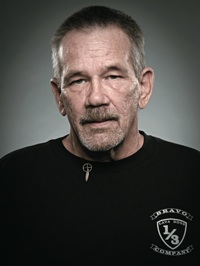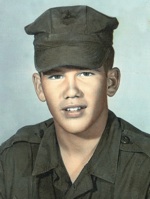 Daniel Pierce
Daniel Pierce
Corporal
1st Marine Div.; 3rd Marine Div.
March 1966-March 1967;
Jan. 1968-May 1968
I joined the Marines in 1965 and went to boot camp in San Diego. I was a very bad Marine—spent time in the motivation platoon—but I could PT the hell out of anybody and that was my salvation, basically. My first time over to Vietnam was on a ship, and wading to shore in Da Nang with a sea bag, no guns, I thought, “What are we, nuts?”
On my first tour in 1966, I was fortunate to have combat-experienced men teach me the ways of war and, more importantly, how to stay alive. I wasjust a kid off the farm, and I gleaned every bit of knowledge I could off of these guys. I was a rifleman assigned to Alpha Company, 1st Battalion, 1st Marines. It was mostly small skirmishes, ambushes, sniper fire and lots of antipersonnel mines.
I had about 12 days to go before my tour was over when I got wounded in March 1967. I was third in line on a squad patrol. The point man set off a 60mm mortar round booby trap that was buried in a paddy dike. I had shrapnel in my face, hands, legs, torso. Lost a part of my left kidney. Some bowel damage, groin. I was awake the whole time. It punctured my lung and I couldn’t breathe.
I spent a couple of months in the Great Lakes Naval Hospital. From there, they put me in Marine Barracks because I had a few medals. It was a terrible place to be for me, because it was dress blues and escorting bodies at Midway Airport. They also had me speak to Kiwanis, Lions and Rotary clubs. They made my life miserable, so I volunteered to go back to Vietnam, where I felt I could actually make a difference. Only it was a whole different war when I went back in January 1968.
In Da Nang, the first thing that struck me was the whole airport was bombed out. It was a chaotic mess. The Tet Offensive took out Khe Sanh and Hue City, and the North Vietnamese were hitting other strategic spots. I went to Bravo 1/3, north of Dong Ha, where I saw the North Vietnamese walking rocket fire across the Cua Viet River. They blew up the fuel dump—tremendous fire. During my first tour, it was mostly Viet Cong that we fought, where in ’68 it was all NVA, and they were better equipped and better trained than the American forces were.
End of April, we were TDY to Marine Battalion Landing Team 2/4 on an operation to save Dong Ha Marine Combat Base from being overrun by elements of the NVA 320th Division. Two platoons got on amtracs to cross the Bo Dieu River on April 30 to sweep toward the village of Dai Do to hook up with the 2/4, but we got pinned down and surrounded not far from the river.
Caught in a hornet’s nest, we were being shot right off the amtracs by the North Vietnamese. This was really the first sustained action the guys had seen. Before we even crossed the river, the company commander, the gunnery sergeant, the executive officer and the 2nd Platoon commander were all killed. There was a fortified village right where we crossed the river, and the NVA had dug in there. We finally made it across but sustained more heavy casualties and had to back out and set up for a harrowing night.
I had lost my closest friend; he was killed in that assault on the village. I went kind of wacko after that and started taking chances.
 The next day, we again went into the village. The Vietnamese had crept out during the night and had re-formed across this canal. We got on the amtracs and started crossing this wide-open graveyard, and we got pinned down again. I was trying to get to the tree line, and I had my radioman with me. I was doing stuff I shouldn’t have been doing, but I had no business taking chances with his life. We both were hit. A few years ago, I got a hold of him and apologized. He didn’t think I did anything wrong.
The next day, we again went into the village. The Vietnamese had crept out during the night and had re-formed across this canal. We got on the amtracs and started crossing this wide-open graveyard, and we got pinned down again. I was trying to get to the tree line, and I had my radioman with me. I was doing stuff I shouldn’t have been doing, but I had no business taking chances with his life. We both were hit. A few years ago, I got a hold of him and apologized. He didn’t think I did anything wrong.
I got shot about 4 p.m. and was kind of left out there. Afterwards a few guys said they tried to get to me but couldn’t. I crawled out, and finally a corpsman from 2/4 helped me back to the river. Because of the heavy fighting still going on, they wouldn’t bring any medevacs. The bullet went through my diaphragm so I couldn’t breathe, and they put me in the back of an amtrac with other wounded. They were doing their triage deal, figuring I wasn’t gonna make it. Once in a while a corpsman would come back and check on me and go away. Finally I grabbed him by the shirt and I go, “Get me the fuck outta here, ’cause I ain’t dying.”
Excellent doctors at Dong Ha Field Hospital saved my life. I was shot in the kidney and had prior damage to my other kidney from ’67, so I had renal failure. They sent me to Japan for dialysis, and my left kidney started working again. From there I went to Bethesda, where I spent about four months and was medically retired from the military.
I’ve looked down many avenues to stop the hurt and the guilt and the pain. I went to the Wall about eight years in a row. I left all my medals there, because I thought that’s where they belonged. One night I was sitting there. It was dark, everybody was gone and I heard the fellas say, “It’s OK, you can go home now.” So I went home. But I’m still looking for peace. There’s gotta be a landing zone somewhere.
From the documentary Wisconsin Vietnam War Stories, by Wisconsin Public Television, www.wisconsinstories.org/vietnam.
This story was originally published in the December 2010 issue of Vietnam magazine.




